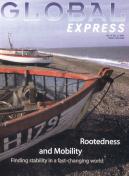 |
rediscovering rootedness, depth and reality
rediscovering rootedness, depth and
reality
Just at present I would have to say that I identify considerably more with mobility than with rootedness. At the end of last year I left the city which had been my home for two years and where many of my closest friends live. For the last three months I have been constantly on the move, and when (before long) I do settle down, it will almost certainly be in a place where I have never lived before. Such mobility can bring opportunities to view life from a different angle, to live into the experiences of others, and so to challenge our perceptions of what life is all about. This was certainly true for me recently during two months travelling in Kenya, Zimbabwe, South Africa and Ethiopia, meeting people from varied walks of life: what a privilege!
For many of these people, mobility and the communications revolution are a world away from daily life. Despite the Internet’s remarkable capacity for linking people across the globe, the majority of the world’s population is not ‘on line’. Yet Western society might well envy the strong sense of rootedness which becomes evident time and again. There is a deep connection to the people and locality which represent home—so often I was invited back to meet a person’s family and see their home because only then would I have really met that person. (As I write it suddenly becomes obvious to me why the time in Africa had the unexpected effect of deepening my sense of belonging to my own country.) There is also a rootedness in culture, reflected in the pride with which traditional music and dance were performed for us in place after place.
However, the most fundamental and unifying sense of rootedness and identity springs from faith in God, which bubbles to the surface at every opportunity. When there is singing it will inevitably be to, or about, God. When there is food on the table, God is thanked for such provision—yesterday there may have been none. Even the minibus-taxis have reassuring stickers such as: ‘Relax. God is in control’. (Unlike the driver, it occasionally seems...)
Such rootedness is reflected in the depth and reality experienced in everyday life, which show up all too clearly the superficialities of Western materialist society. Everywhere we went there were people ready to take on the vast struggles facing their countries. In Zimbabwe the rule of law is gradually receding as the President increasingly seizes power for himself; we met one of many Opposition MPs who continue to oppose the regime’s injustices, despite having received death threats for their efforts. Kenya’s economy has been crippled by corruption and poor administration, yet the editor of a national daily, who has twice been jailed for exposing government malpractice, says, ‘I would rather be a prisoner of the government than of my own conscience’. South Africa has 4.2 million AIDS sufferers, the highest figure in Africa; in the face of such ravages it is humbling to meet people who, in their own communities, give sacrificial love and care to the sufferers and families (often orphans) left behind.
The temptation, of course, is to flee with relief back to the shelter of a society where one has no such struggles. At home we can live a comfortable life, complete with ‘basic necessities’ such as television, mobile phones and the Internet. Our society is reasonably stable and will continue to provide for us without threatening our freedom or enjoyment of life. But what a shallow life it is, especially when thrown into relief alongside the depth of the experiences I’ve described. Indeed, it begins to feel thoroughly unsatisfying to pursue one’s own life without committing to any larger purpose. Yet if one were to seek such a purpose in many Western countries, it would not necessarily be for democracy, freedom of speech, basic justice or human rights. Could it be, then, that the equally important struggle to which we are called is to rediscover that quality of rootedness, depth and reality in life?
The benefits of increased mobility and connecting with the world at large are many. But we must also value a sense of rootedness and a clear knowledge of our identity. The more ‘mobile’ I am, the more I find myself needing to draw on the rootedness which is found in the One who gives us that identity. As St Augustine wrote, ‘Our hearts are made for you, O God, and they know no rest until they find their rest in you’.
Chris Lancaster, Australia
|













